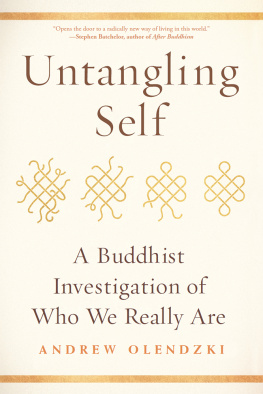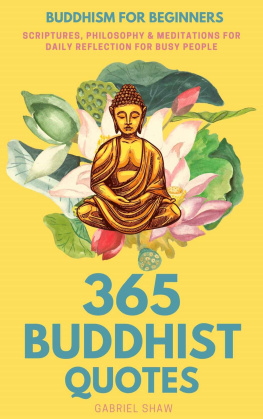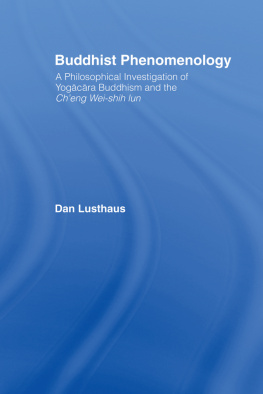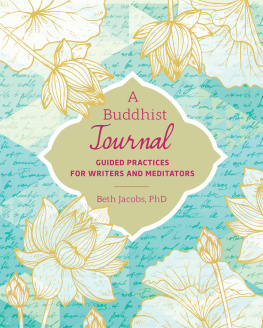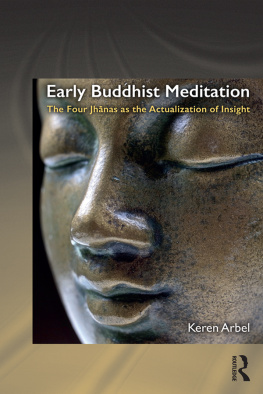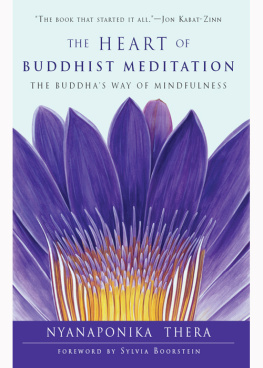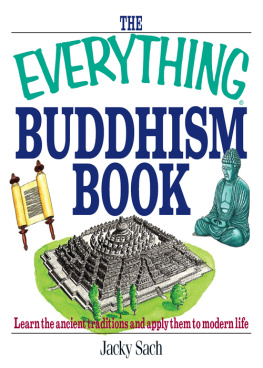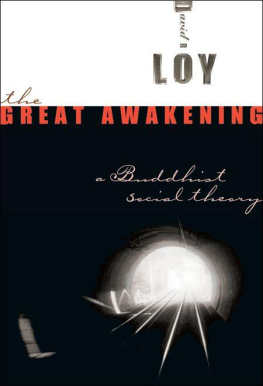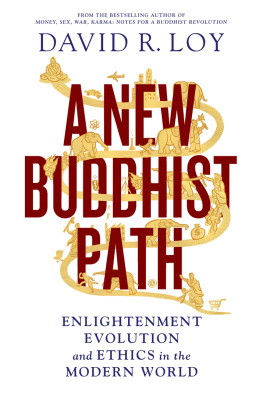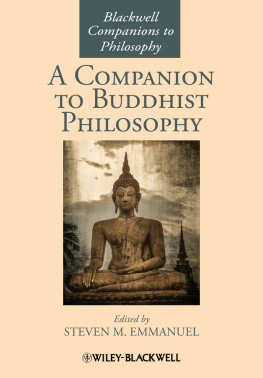More Praise for
UNTANGLING SELF
Olendzki has done it again. In this volume he manages to make difficult teachings accessible, but without losing the challenge posed to us by the Buddhist understanding of the self. His style is even a bit deceptive, writing about profound matters in a nearly conversational voice. This book is essential to all of us who continue to puzzle over the Buddhist formulation of the self.
PAUL FULTON , coauthor and coeditor of Mindfulness and Psychotherapy
A rare gem. Wise and deeply rooted in the original Buddhist texts, Untangling Self is accessible and compelling, a roadmap for release from personal and societal suffering and a guide to a deeper understanding of mindfulness.
SUSAN M. POLLAK , MTS, EdD,
President of the Institute for Meditation and Psychotherapy
Olendzkis perspective on Buddhist teachings carries the freshness of science and the fragrance of the Pali tradition. His voice is natural, enabling the words to reach in and touch the reader, offering both challenge and inspiration.
GREGORY KRAMER , meditation teacher and author of Insight Dialogue

Brilliant! A breathtakingly clear synthesis of a vast body of early Buddhist teachings. It is the work of a Buddhist scholar and meditation practitioner who has the credibility and courage to challenge modern myths about Buddhism in light of the radical teachings of the Buddha. You will want to read it over and over to absorb the no-nonsense wisdom and liberating insights it offers for our lives and times.
Christopher Germer, author of The Mindful Path to Self-Compassion

Untangling Self invites us to see nonself, interdependence, and mindfulness as rational, real-world solutions to the human condition of suffering.
In psychologically rich essays that equally probe traditional Buddhist thought and contemporary issues, Andrew Olendzki helps us to make use of ancient Buddhist thought in our day-to-day life. His writing is sophisticated and engaged, filled with memorable imagery and insight drawn from decades of study, reflection, and meditation on Buddhist teachings. Seasoned Buddhist readers and anyone interested in the intellectual heart of Buddhism will find this collection of fascinating essays rewarding.

Finely crafted essays effortlessly combine penetrating analyses of key ideas of early Buddhism with practical advice on how to apply them. By challenging core assumptions about who we think we are, Untangling Self opens the door to a radically new way of living in this world. Stephen Batchelor, author of After Buddhism
ANDREW OLENDZKI was trained in Buddhist Studies at Lancaster University in England, as well as at Harvard and the University of Sri Lanka. Olendzki is the former executive director of the Insight Meditation Society (IMS) and the Barre Center for Buddhist Studies (BCBS) in Barre, Massachusetts, and former executive editor of Insight Journal. Andrew lives in Amherst, Massachusetts.
Wisdom Publications
199 Elm Street
Somerville, MA 02144 USA
wisdompubs.org
2016 Andrew Olendzki
All rights reserved.
No part of this book may be reproduced in any form or by any means, electronic or mechanical, including photography, recording, or by any information storage and retrieval system or technologies now known or later developed, without permission in writing from the publisher.
Library of Congress Cataloging-in-Publication Data
Names: Olendzki, Andrew, author.
Title: Untangling self : a Buddhist investigation of who we really are / Andrew Olendzki.
Description: Somerville, MA : Wisdom Publications, 2016. | Includes bibliographical references and index.
Identifiers: LCCN 2016011995 (print) | LCCN 2016040683 (ebook) | ISBN 9781614293002 (pbk. : alk. paper) | ISBN 1614293007 (pbk.) | ISBN 9781614293217 () | ISBN 161429321X ()
Subjects: LCSH: Buddhism Psychology. | Buddhist ethics.
Classification: LCC BQ4570.P76 O45 2016 (print) | LCC BQ4570.P76 (ebook) | DDC 294.3/422 dc23
LC record available at https://lccn.loc.gov/2016011995
ISBN 978-1-61429-300-2 ebook ISBN 978-1-61429-321-7
20 19 18 17 16
5 4 3 2 1
Cover design by Philip Pascuzzo.
Interior design by Gopa & Ted2, Inc. Set in Garamond Premier Pro 11.6/15.8.

| Publishers Acknowledgment |
The publisher gratefully acknowledges the generous contribution of the Hershey Family Foundation toward the publication of this book.

| Introduction: The Challenge of Nonself |
Tangled within, tangled without;
People are tangled in tangles.
And so I ask you, Gotama
Who can untangle this tangle?
A wise one of stable virtue,
Developing mind and wisdom,
A prudent and ardent person
They can untangle this tangle.
The scientific enterprise has looked closely at the world around us for several centuries now, using ever-more-powerful tools and interpretive models to do so, and it has a lot of things pretty well figured out. Profound mysteries remain at the frontiers of knowledge, of course, and perhaps one of the things we have learned is that such unknowns may always exist. But there is not much in the midsection of the universe we inhabit, between the very smallest and very largest levels of scale, about which we do not have a pretty good working knowledge. Yet for all this impressive accumulation, we know very little about the knowers of this knowledge. That is to say, we still do not know ourselves very well.
It has been both easier and more useful to look outward rather than inward, for the material world is quite obedient to natural laws and learning to exploit these laws has been rewarded with many practical advantages. But the time has come to turn our instruments on ourselves in earnest in an effort to understand the greatest mystery of all. Who are we? What is the self? What is this phenomenon that stands in the center of everything trying to understand it all?
We are fortunate to live in a time when so much is being learned about the mind and the brain, when consciousness itself is a favored topic of focused investigation, and when experimental tools and techniques for investigating the subject are evolving so dramatically. Hardly a week goes by without a significant new insight into the mind emerging from researchers and theorists around the globe. Under the influence of dramatic advances in the modern understanding of mind, brain, and behavior, we are witnessing a systematic deconstruction of the idea of the self as an essential entity. It is being redefined as a bundle of socially influenced narratives and behavioral patterns that has emerged gradually during early development and undergoes continual modification as experience unfolds. This is familiar territory for Buddhists, who have been making a similar point for some time now.
The reason the self causes difficulty is that it is simultaneously so intuitively obvious and such a confused idea. Buddhists consider it a folk belief, a superstition, a conceptual reflex, a linguistic habit, a mistaken assumption, a fuzzy idea, a mirage. This is why the Buddha stayed away from it as much as possible, even remaining silent when pressed upon the subject. To say the self does not exist is as problematic as saying it does exist, because the whole notion of self is flawed to the bone. So much so, in fact, that the burden of proof to explain what they mean by it should be upon those who use the notion of self, rather than on those who would question its existence. Like the flatness of the earth or the solidity of the table, it has utility at a certain level of scale socially, linguistically, legally but thoroughly breaks down when examined with closer scrutiny.

